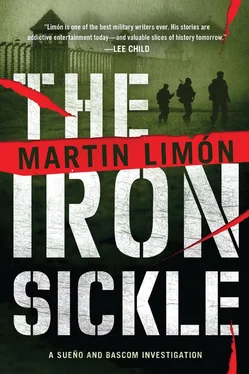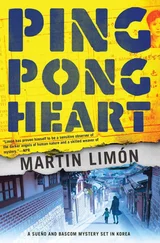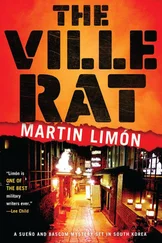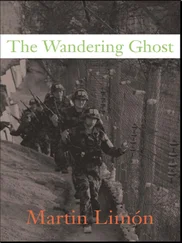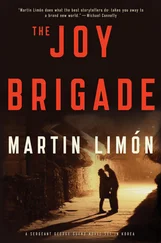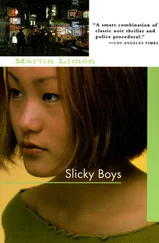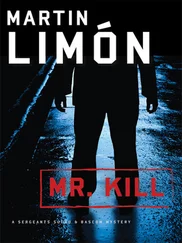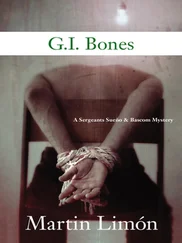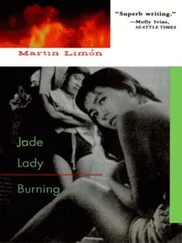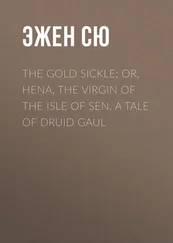Martin Limon - The Iron Sickle
Здесь есть возможность читать онлайн «Martin Limon - The Iron Sickle» весь текст электронной книги совершенно бесплатно (целиком полную версию без сокращений). В некоторых случаях можно слушать аудио, скачать через торрент в формате fb2 и присутствует краткое содержание. Год выпуска: 2014, ISBN: 2014, Издательство: Soho Press, Жанр: Полицейский детектив, на английском языке. Описание произведения, (предисловие) а так же отзывы посетителей доступны на портале библиотеки ЛибКат.
- Название:The Iron Sickle
- Автор:
- Издательство:Soho Press
- Жанр:
- Год:2014
- ISBN:978-1-61695-392-8
- Рейтинг книги:3 / 5. Голосов: 1
-
Избранное:Добавить в избранное
- Отзывы:
-
Ваша оценка:
- 60
- 1
- 2
- 3
- 4
- 5
The Iron Sickle: краткое содержание, описание и аннотация
Предлагаем к чтению аннотацию, описание, краткое содержание или предисловие (зависит от того, что написал сам автор книги «The Iron Sickle»). Если вы не нашли необходимую информацию о книге — напишите в комментариях, мы постараемся отыскать её.
The Iron Sickle — читать онлайн бесплатно полную книгу (весь текст) целиком
Ниже представлен текст книги, разбитый по страницам. Система сохранения места последней прочитанной страницы, позволяет с удобством читать онлайн бесплатно книгу «The Iron Sickle», без необходимости каждый раз заново искать на чём Вы остановились. Поставьте закладку, и сможете в любой момент перейти на страницу, на которой закончили чтение.
Интервал:
Закладка:
I didn’t have time to explain all I’d learned in that cave. “They have reason,” I said.
Ernie flashed his badge to the gate guards and gunned the engine of the little jeep all the way along the winding road that led to the top of the hill above the Yongsan Main PX where the AFKN complex sat. Besides the television and radio studios, AFKN also had a barracks and a small Quonset hut set aside as their all-ranks restaurant and nightclub. The AFKN Club.
By the time we barged into the main ballroom, the AFKN Club was mostly empty. The lunch hour rush was over. We made our way to the far side of the building and crossed a well-tended lawn to the main broadcast facility. We walked down a hallway lined with radio broadcast booths, checking each one as we went, getting startled looks from at least one GI disc jockey with earphones enveloping his head. Finally, we reached the TV studio.
A bulb atop the big camera glowed red. The lights on the sound stage were on, bright and hot. Slumped behind the camera was a GI in fatigues, his throat cut, lying in a puddle of blood. On the stage, sprawled over the news anchor desk, lay a man I recognized. He was the one who read the officially-sanctioned world news to us every night in a deep monotone. The side of his face rested in a puddle of gore.
“Back here,” Ernie shouted.
The engineer at the broadcast control panel was still alive. With paper towels she’d grabbed along the way, Captain Prevault stanched the blood on the side of his neck.
“The bleeding isn’t arterial,” she said. “He’ll live.”
He croaked something. I leaned closer. “What?”
“The camera,” he said.
“What about the camera?” I asked.
“Turn it off. It’s on. We’re broadcasting live.”
Broadcasting death was more like it.
The MPs shut the compound down. Nothing moved but I had little hope that we’d find them. A quick inventory by the AFKN First Sergeant revealed that one of their mobile broadcast trucks was missing. I immediately called Mr. Kill and left a message with Officer Oh. She’d relay a description of the truck, and the license number, to the KNPs.
“Do they still have Mr. Walton?” she asked.
“Yes,” I answered, “as far as we can tell.”
I was exhausted but Captian Prevault kindly brought me a cup of hot coffee from the AFKN Club. Ernie and I allowed a gaggle of MP investigators to start interviewing anybody who might’ve seen anything.
“Okay,” Ernie said. “They’ve made their statement. First with Mr. Barretsford, then with Collingsworth, and again with the two GIs in the signal truck.”
“Now they’ve graduated to live TV,” Captain Prevault said.
“So where are they now?” Ernie asked.
“Koreans don’t watch it,” I said.
Captian Prevault touched my forearm, concerned.
“Don’t watch what?” Ernie asked.
“They don’t watch AFKN. Not during the day anyway.”
On weekdays, the two Korean television stations weren’t allowed by the government to start broadcasting until five P.M.
“Okay,” Captain Prevault said slowly. “The Koreans, most of them, aren’t watching.”
“They didn’t see the murder,” I said.
“No, they didn’t.” She squeezed my arm tighter. “You need rest.”
“That means,” I continued, “that they’ll want a big venue where the Korean public will be watching.”
“Like a Korean TV station?” Ernie asked.
“Maybe. But I don’t think so. Not now. The KNPs will be alert for that.”
“Then where?”
“Someplace big,” I said. “Someplace grand.”
Captain Prevault tore open a small bag of saltine crackers for me. “Eat,” she said. I did. Before I had finished chewing, she brought me a cup of water. I drank it down.
An army sedan pulled up outside. Somebody ran through the front door. Boots tromped down the hallway.
“They found them,” Riley said, pushing through the double swinging doors of the broadcast station. I’d never seen him so excited or his face so flushed, except when he was halfway into a fifth of Old Overwart.
“They found who?” I asked.
“The man with the iron sickle. And that broad. They’ve got the old goat, and they’re threatening to kill him.”
“Where?”
Riley looked at a pad of paper he held in his hand. “Someplace called Kong Ha Moon.”
“In downtown Seoul?”
“Right in the heart of downtown Seoul.”
Riley meant Guanghua-mun, the Gate of the Transformation of Light.
Ernie and I hurried outside to the jeep. Captain Prevault slipped in the back seat.
“You can’t go!” Ernie shouted.
“I’m going!” she said.
He cursed and slammed the jeep in gear, and we were heading out of Gate Seven, turning left toward the road that leads through Namsan Tunnel.
In the last few days, while I’d been wandering around the Taebaek Mountains, the secret of the man with the iron sickle had seeped out to the Korean public. The story hadn’t appeared in official news outlets but word of mouth had spread, especially amongst those groups who, against all pressures, opposed the military regime that ran the country.
Sejong-ro, the main road leading down the center of Seoul, past the towering statue of Admiral Yi Sun-shin, was lined with protestors. Up ahead loomed the huge edifice of Guanghua-mun. Many of the protestors waved signs saying “Yankee Go Home” and other things written in Korean having to do with stopping the rape of Korea and not allowing foreigners to abuse our people any longer. They might not know the exact details of what had happened with the Lost Echo but they could read between the lines. Similar incidents had occurred at other places during the war and the man with the iron sickle was making it abundantly clear that he wanted the Americans to leave. The KNPs were having trouble holding back the crowds but regular traffic had been rerouted. Ernie had to flash his CID badge at the KNP roadblock. Still they wouldn’t let us through. I explained in Korean that Mr. Kill would be waiting for us. Someone radioed ahead and within a couple of minutes, a whistle blew and the white-gloved KNP pulled back the barricade.
An AFKN mobile broadcasting van sat at the foot of the three-story stone gate known as Guanghua-mun. In granite relief, valiant masses of workers, farmers, and soldiers strove toward the light above that was freedom. A rope ladder with wood slat footholds hung in front of the inspiring fresco. A platform used by painters and cleaners had been pulled out of reach all the way to the top. Above it, peering down at us, stood the man with the iron sickle and next to him, crouching, smoking her usual cigarette, was Madame Hoh.
We parked and climbed out of the jeep. Captain Prevault looked up. “They’ll fall,” she said.
“Better if they do,” Ernie replied, “when you consider what the KNPs will do to them.”
Mr. Kill walked up to me. “You can’t see him because he’s tied up and lying down. But they used the platform to haul the American up there. We’ve spotted him from our helicopter. It’s an elderly man who matches the description of Covert P. Walton. They’re saying they want a copy of their original claim published in the Chosun Ilbo , this afternoon’s edition, or they’ll toss him off.”
“They already told you that?”
“Yes.”
“Is the government going to allow it?”
“Impossible. But the ROK Army is lobbying hard for it.”
“The ROK Army?”
“Why do you think Major Rhee has been tailing you all this time? Her faction in the command structure wants the Americans out. And this story, this ‘Lost Echo’ atrocity, is just the sort of thing to turn public opinion in their favor.”
“But we support the ROK Army,” I said. “Why would they want us out?”
Читать дальшеИнтервал:
Закладка:
Похожие книги на «The Iron Sickle»
Представляем Вашему вниманию похожие книги на «The Iron Sickle» списком для выбора. Мы отобрали схожую по названию и смыслу литературу в надежде предоставить читателям больше вариантов отыскать новые, интересные, ещё непрочитанные произведения.
Обсуждение, отзывы о книге «The Iron Sickle» и просто собственные мнения читателей. Оставьте ваши комментарии, напишите, что Вы думаете о произведении, его смысле или главных героях. Укажите что конкретно понравилось, а что нет, и почему Вы так считаете.
